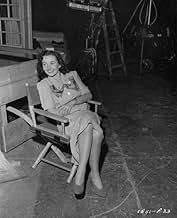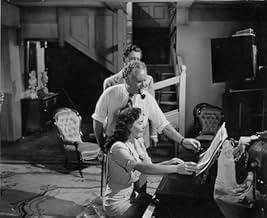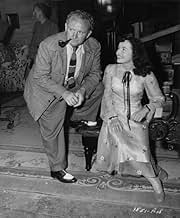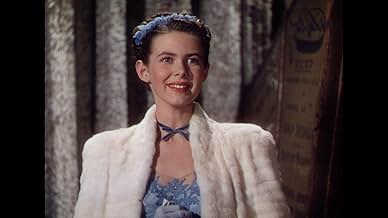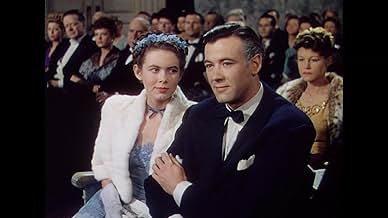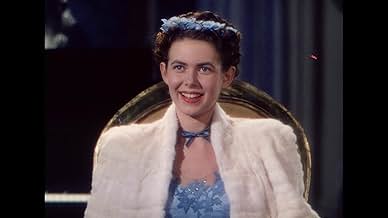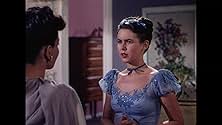NOTE IMDb
6,4/10
398
MA NOTE
Une pianiste promise à une grande carrière, décide de tout abandonner quand elle se rend compte que sa réussite risque de mettre en péril celui de son professeur dont elle est amoureuse. Ell... Tout lireUne pianiste promise à une grande carrière, décide de tout abandonner quand elle se rend compte que sa réussite risque de mettre en péril celui de son professeur dont elle est amoureuse. Elle part et épouse un fermier dont elle aura une fille.Une pianiste promise à une grande carrière, décide de tout abandonner quand elle se rend compte que sa réussite risque de mettre en péril celui de son professeur dont elle est amoureuse. Elle part et épouse un fermier dont elle aura une fille.
- Récompenses
- 2 victoires au total
Bill Carter
- George Sampter
- (as William Carter)
Maria Ouspenskaya
- Madame Goronoff
- (as Mme. Maria Ouspenskaya)
Lillian Bronson
- Music Teacher
- (non crédité)
Edgar Caldwell
- Call Boy
- (non crédité)
Paulina Carter
- 12 Year Old Girl
- (non crédité)
Maurice Cass
- Music Teacher
- (non crédité)
Charles Coleman
- Butler
- (non crédité)
Avis à la une
Borzage's romantic melodrama follows a gifted young (female) pianist torn between her egomaniacal maestro and the absurdly good young farm boy she grew up with (played by a creepy, almost psychopathically serene Bill Carter). The music is really played by Arthur Rubinstein (who was given a huge paycheck for the time, especially considering the studio, Republic pictures, whose first color film this was) and features some great - if in the end excessive - pieces by Rachmoninoff and others. The characters are ultimately uninteresting and so sadly it hardly matters who ends up with whom, though everyone tries their best. It's all very nice though ultimately forgettable. The highpoint of this rather lavish production is the beautiful technicolor cinematography, which is quite nicely captured in the print restored by UCLA that is used on the laserdisc and VHS tape editions.
...and I always will...
Some say his post WW2 works were inferior to the thirties major works .Perhaps so.But it is no reason to dismiss them.
"I've always loved you" is unique,it defines music as a way of communicating emotions.Leopold and Myra use Rachmaninoff (mainly "Second" ),Beethoven ,Lizt and other musicians to express their admiration,their tenderness,their love,their jealousy,their pride,their lust for life,their hate,their contempt ,you name it.In the central scene ,where Myra plays the piano with Leopold's full symphonic orchestra is a real desperate fight ,probably the best concert scene ever filmed (with the eventual exception of Hitchcock's "the man who knew too much" (1956))And that scene is followed by another one where the two musicians ,although miles apart ,continue their "conversation" in a strange telepathy.
The audience who knows Borzage's earlier works (such as "three comrades" "little man what now?" "mortal storm" "cargo" ...) might be disoriented while watching the beginning of the movie .But the master's touch is still here.
Two elements are Borzagesque:the first is George's character.He is akin to Hans ("little man" ) and to the "three comrades" .He is the man who believes in true love ,the simple man who is like a bull in a china shop when he attends the first concert but whose heart is always in the right place.
And the other one is Mme Maria Ouspenskaya (she is granted a "Mme" during the cast and credits!) who was the unforgettable mother of Martin (James Stewart) in Borzage's memorable "mortal storm" .Here she portrays Leopold's mother with authority.Her death is a great moment of delicacy when the music stops in her hand.
Probably not as appealing as Borzage's earlier works,this film is yet waiting to be rediscovered.
Some say his post WW2 works were inferior to the thirties major works .Perhaps so.But it is no reason to dismiss them.
"I've always loved you" is unique,it defines music as a way of communicating emotions.Leopold and Myra use Rachmaninoff (mainly "Second" ),Beethoven ,Lizt and other musicians to express their admiration,their tenderness,their love,their jealousy,their pride,their lust for life,their hate,their contempt ,you name it.In the central scene ,where Myra plays the piano with Leopold's full symphonic orchestra is a real desperate fight ,probably the best concert scene ever filmed (with the eventual exception of Hitchcock's "the man who knew too much" (1956))And that scene is followed by another one where the two musicians ,although miles apart ,continue their "conversation" in a strange telepathy.
The audience who knows Borzage's earlier works (such as "three comrades" "little man what now?" "mortal storm" "cargo" ...) might be disoriented while watching the beginning of the movie .But the master's touch is still here.
Two elements are Borzagesque:the first is George's character.He is akin to Hans ("little man" ) and to the "three comrades" .He is the man who believes in true love ,the simple man who is like a bull in a china shop when he attends the first concert but whose heart is always in the right place.
And the other one is Mme Maria Ouspenskaya (she is granted a "Mme" during the cast and credits!) who was the unforgettable mother of Martin (James Stewart) in Borzage's memorable "mortal storm" .Here she portrays Leopold's mother with authority.Her death is a great moment of delicacy when the music stops in her hand.
Probably not as appealing as Borzage's earlier works,this film is yet waiting to be rediscovered.
"I've Always Loved You" is a 1946 production from Republic Pictures directed by Frank Borzage from a script by Borden Chase based on a magazine short story he'd published called "Concerto." In the mid-1940's, as World War II was winding down, Republic Pictures founder Herbert Yates, like other Hollywood studio owners, saw that the "B" picture was doomed and decided to push his company towards major-studio status by hiring important talents behind the camera: Ben Hecht for "Voice in the Wind," Orson Welles for "Macbeth" and Borzage under a long-term contract under which Yates would bankroll him in the sorts of big, romantic tear-jerkers that had been Borzage's specialty since his star-making film, "Seventh Heaven," in 1927. Oddly, the first film Borzage wanted to make at Republic was a John Wayne Western called Dakota, but Yates took that film away from both Borzage and Wayne and sent the script down his "B" Western assembly line instead. Borzage ended up hooking up with writer Chase, who came up with a tale that served as an excuse for Borzage to put a lot of great classical music on the screen, most of it played by pianist Artur Rubinstein (there are a few bits by a Republic studio orchestra as well), as well as staging the familiar romantic situations for which Borzage was famous.
The film opens in Philadelphia, where the world-renowned pianist and conductor Leopold Goronoff (Philip Dorn, an actor Warner Bros. had signed and tried to build into a sort of bionic combination of Paul Lukas and Claude Rains) is holding open auditions for a one-year scholarship for piano students. Goronoff's old friend Frederick Hassman (Felix Bressart), himself a formerly great concert pianist until he married an American woman and settled down in the farm town from which she had come, retiring from music and ultimately ruining his hands with farm work, shows up at the audition with his daughter Myra (Catherine McLeod). For all the money Herbert Yates threw at this movie, including paying for three-strip Technicolor and getting "name" talents behind the camera, he didn't go for star actors in the cast, and I got the impression Borzage had cast McLeod less for any acting ability than that she was a good enough pianist herself she could synchronize on screen with Rubinstein's playing and we could actually see her fingers striking piano keys instead of those awful shots with the body of the piano interposed between the camera and her hands. Goronoff thinks Myra is so good a pianist he offers to take her under his wing and let her move in with him - though since this is a 1946 movie, he does not insist that she become his mistress as part of the deal the way Lowell Sherman did with Madge Evans in a similar situation in the 1932 film "The Greeks Had a Word for Them," a.k.a. "Three Broadway Girls." Indeed, Myra's virtue is in no danger because she's protected not only by the Production Code but the formidable chaperoning of Goronoff's mother, played by Maria Ouspenskaya, billed with the honorific "Madame" in front of her name and easily taking the acting honors in this film. She makes a concert debut but the experience is so traumatic that she goes back to daddy's farm and accepts the marriage proposal of George Sampter (William Carter, a rather gangly but still nice-looking man whom we first get to see wearing jeans below the waist and nothing above it), and a couple of jump-cuts later Myra and George have a 17-year-old daughter who has dreams of piano stardom herself.
"I've Always Loved You" is a beautiful film when the characters are shown actually making music, but it's annoyingly sexist when they aren't; not only does Goronoff make a couple of blatantly anti-woman speeches to the effect that music is a man's world and women don't belong in it (ironic since at the time the film was made one of the world's top classical pianists was not only a woman but had the same first name as this film's heroine and a similar last name, too: Dame Myra Hess), but the whole story is framed as a contrast between Myra's pursuit of a musical career and her desire for a "normal" life as a wife and mother. Quite a few 1930's and 1940's movies set up that dichotomy for women seeking careers in singing, playing or dancing, and one of the few that didn't resolve its plot in that sexist fashion was a quite remarkable film from Republic's first decade as a studio, "Follow Your Heart," in which former Metropolitan Opera soprano Marion Talley played a woman who's encouraged at the end to "follow your heart" and go for the big operatic career rather than marry the small-town boyfriend and give up her dreams of stardom. Mostly, though, we got endings like the sexist cop-out of the otherwise magnificent film "Maytime" (1937), the best of the eight Jeanette MacDonald-Nelson Eddy movies, in which the aging diva Marcia Mornay (MacDonald) tells the young aspiring opera singer that the career isn't worth the heartbreak it entails and she should stay home and marry her boring boyfriend instead. In "The Red Shoes" (1948) the dilemma literally tears the central character, aspiring ballerina Moira Shearer, apart: torn between the choreographer who says she has to renounce love for her career and the composer who wants to write for her and also to marry her, she runs away after her performance and gets killed when she falls off a trestle into the path of an oncoming train: another annoying sexist cop-out ending to what's otherwise a great film. "I've Always Loved You" is hardly in the league of "Maytime" or "The Red Shoes" as a movie, but it shares with them this annoying streak of sexism that makes it a trial to sit through.
The film opens in Philadelphia, where the world-renowned pianist and conductor Leopold Goronoff (Philip Dorn, an actor Warner Bros. had signed and tried to build into a sort of bionic combination of Paul Lukas and Claude Rains) is holding open auditions for a one-year scholarship for piano students. Goronoff's old friend Frederick Hassman (Felix Bressart), himself a formerly great concert pianist until he married an American woman and settled down in the farm town from which she had come, retiring from music and ultimately ruining his hands with farm work, shows up at the audition with his daughter Myra (Catherine McLeod). For all the money Herbert Yates threw at this movie, including paying for three-strip Technicolor and getting "name" talents behind the camera, he didn't go for star actors in the cast, and I got the impression Borzage had cast McLeod less for any acting ability than that she was a good enough pianist herself she could synchronize on screen with Rubinstein's playing and we could actually see her fingers striking piano keys instead of those awful shots with the body of the piano interposed between the camera and her hands. Goronoff thinks Myra is so good a pianist he offers to take her under his wing and let her move in with him - though since this is a 1946 movie, he does not insist that she become his mistress as part of the deal the way Lowell Sherman did with Madge Evans in a similar situation in the 1932 film "The Greeks Had a Word for Them," a.k.a. "Three Broadway Girls." Indeed, Myra's virtue is in no danger because she's protected not only by the Production Code but the formidable chaperoning of Goronoff's mother, played by Maria Ouspenskaya, billed with the honorific "Madame" in front of her name and easily taking the acting honors in this film. She makes a concert debut but the experience is so traumatic that she goes back to daddy's farm and accepts the marriage proposal of George Sampter (William Carter, a rather gangly but still nice-looking man whom we first get to see wearing jeans below the waist and nothing above it), and a couple of jump-cuts later Myra and George have a 17-year-old daughter who has dreams of piano stardom herself.
"I've Always Loved You" is a beautiful film when the characters are shown actually making music, but it's annoyingly sexist when they aren't; not only does Goronoff make a couple of blatantly anti-woman speeches to the effect that music is a man's world and women don't belong in it (ironic since at the time the film was made one of the world's top classical pianists was not only a woman but had the same first name as this film's heroine and a similar last name, too: Dame Myra Hess), but the whole story is framed as a contrast between Myra's pursuit of a musical career and her desire for a "normal" life as a wife and mother. Quite a few 1930's and 1940's movies set up that dichotomy for women seeking careers in singing, playing or dancing, and one of the few that didn't resolve its plot in that sexist fashion was a quite remarkable film from Republic's first decade as a studio, "Follow Your Heart," in which former Metropolitan Opera soprano Marion Talley played a woman who's encouraged at the end to "follow your heart" and go for the big operatic career rather than marry the small-town boyfriend and give up her dreams of stardom. Mostly, though, we got endings like the sexist cop-out of the otherwise magnificent film "Maytime" (1937), the best of the eight Jeanette MacDonald-Nelson Eddy movies, in which the aging diva Marcia Mornay (MacDonald) tells the young aspiring opera singer that the career isn't worth the heartbreak it entails and she should stay home and marry her boring boyfriend instead. In "The Red Shoes" (1948) the dilemma literally tears the central character, aspiring ballerina Moira Shearer, apart: torn between the choreographer who says she has to renounce love for her career and the composer who wants to write for her and also to marry her, she runs away after her performance and gets killed when she falls off a trestle into the path of an oncoming train: another annoying sexist cop-out ending to what's otherwise a great film. "I've Always Loved You" is hardly in the league of "Maytime" or "The Red Shoes" as a movie, but it shares with them this annoying streak of sexism that makes it a trial to sit through.
Catherine McLeod gives a terrific star performance as the luscious center of this ambitious romance film from Frank Borzage.
McLeod plays a young pianist of promise who comes under the wing of a famous and slightly crazed pianist (Philip Dorn) whose demands are limitless. She leaves behind her father's farm and the man (William Carter) who loves her selflessly. Will she marry the mad musician or the simple farmer? More than a standard "woman's picture" or romance, this film features role reversals among the male characters with the lusty, aggressive pianist battling the effete and quiet farmer for the girl's affections. There's also this weird synergy between the girl and the pianist because they share the same passion for music while she seems to have nothing at all in common with the farmer .... except love.
McLeod gives a star-making performance and looks great, but her career never quite took off. Dorn and Carter are perfect as the men orbiting her. Co-stars include Maria Ouspenskaya, Fritz Feld, Felix Bressart, Elizabeth Patterson, Lewis Howard, Vanessa Brown, and Cora Witherspoon. And yes that's the young Andre Previn as the student Dorn dismisses.
Maybe not a masterpiece, but this film from Republic, filled with great music and filmed in lush Technicolor, shouldn't be among the forgotten.
McLeod plays a young pianist of promise who comes under the wing of a famous and slightly crazed pianist (Philip Dorn) whose demands are limitless. She leaves behind her father's farm and the man (William Carter) who loves her selflessly. Will she marry the mad musician or the simple farmer? More than a standard "woman's picture" or romance, this film features role reversals among the male characters with the lusty, aggressive pianist battling the effete and quiet farmer for the girl's affections. There's also this weird synergy between the girl and the pianist because they share the same passion for music while she seems to have nothing at all in common with the farmer .... except love.
McLeod gives a star-making performance and looks great, but her career never quite took off. Dorn and Carter are perfect as the men orbiting her. Co-stars include Maria Ouspenskaya, Fritz Feld, Felix Bressart, Elizabeth Patterson, Lewis Howard, Vanessa Brown, and Cora Witherspoon. And yes that's the young Andre Previn as the student Dorn dismisses.
Maybe not a masterpiece, but this film from Republic, filled with great music and filmed in lush Technicolor, shouldn't be among the forgotten.
The Dutch actor Philip Dorn plays a concert maestro, Leopold Goronoff, in this film. He's reputed to be one of the greatest pianists of his age....and he definitely has the ego for this...and then some! An old friend convinces Goronoff to take on a student and Myra (Catherine McLeod) is amazing. Eventually, she has her debut and Goronoff is angry because she is so good...perhaps better than him! What a putz! Despite this, Myra is in love with her mentor....and what chance does her childhood friend, George, have with her?
There are several problems with the film, though on balance the movie isn't bad. There are too many long and intense piano pieces and editing them down a bit or allowing for some lighter classical pieces would have helped the film. Additionally, Dorn's character is simply too awful to care about him and there is no reason for Myra to care about this jerk..none.. It's also very slow and the film doesn't seem to know when to end. On the plus side, McLeod is amazing on the piano, the Technicolor is amazingly good and the basic story is quite sound.
There are several problems with the film, though on balance the movie isn't bad. There are too many long and intense piano pieces and editing them down a bit or allowing for some lighter classical pieces would have helped the film. Additionally, Dorn's character is simply too awful to care about him and there is no reason for Myra to care about this jerk..none.. It's also very slow and the film doesn't seem to know when to end. On the plus side, McLeod is amazing on the piano, the Technicolor is amazingly good and the basic story is quite sound.
Le saviez-vous
- AnecdotesThis was Republic's first feature in Technicolor.
- Crédits fousThe Republic Pictures logo does not appear on this film.
- ConnexionsSpoofed in It's a Grand Old Nag (1947)
Meilleurs choix
Connectez-vous pour évaluer et suivre la liste de favoris afin de recevoir des recommandations personnalisées
Détails
- Durée
- 1h 57min(117 min)
- Couleur
- Rapport de forme
- 1.37 : 1
Contribuer à cette page
Suggérer une modification ou ajouter du contenu manquant

